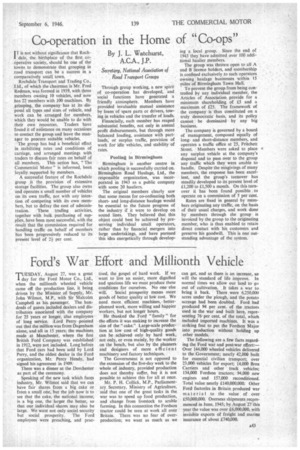Co-operation in the Home of "Co-ops"
Page 45

If you've noticed an error in this article please click here to report it so we can fix it.
By J. L. Watchurst, A.C.A., J.P.
I T is not without significance that Roch dale, the birthplace of the first cooperative society, should be one of the towns to demonstrate that grouping in road transport can be a success in a comparatively small town.
Rochdale Transport and Trading Co., Ltd., of which the chairman is Mr. Fred Redman, was formed in 1939, with three members owning 10 vehicles, and now has 22 members with 100 machines. By grouping, the company has at its disposal all types and sizes of vehicle, and work can be arranged for members, which they would be unable to do with their own resources. Traders have found it of assistance on many occasions to contact the group and leave the manager to procure suitable vehicles.
The group has had a beneficial effect in stabilizing rates and conditions of carriage, and arranged meetings with traders to discuss fair rates on behalf of all members. This action has, "The Commercial Motor" is informed, been loyally supported by members.
A successful feature of the Rochdale group is the provision of extensive storage facilities. The group also owns and operates a small number of vehicles on its own traffic, not with any intention of competing with its own members, but to defray the cost of administration. These trading activities, together with bulk purchasing of supplies, have been most successful, with the result that the commission required for handling traffic on behalf of members has been progressively reduced to its present level of 21 per cent. Through group working, a new spirit of co-operation has developed, and social functions have generated a friendly atmosphere. Members have provided invaluable mutual assistance by loans of spare parts or drivers, towing in vehicles and the transfer of loads.
Financially, each member has reaped substantial benefits, not only in annual profit disbursements, but through more balanced loading, assistance with partloads, or surplus traffic, provision of work for idle vehicles, and stability of rates.
Pooling in Birmingham Birmingham is another centre in which pooling is successfully carried on. Birmingham Road Haulage, Ltd.. the responsible organization, was incorporated in 1943 as a public company with some 20 hauliers.
The original members clearly saw that some means for co-ordinating both shortand long-distance haulage would be essential to the future progress of the industry if it were to develop on sound lines. They believed that this object could best be achieved by preserving individual small operators, rather than by financial mergers into large undertakings, and have pursued this idea energetically through develop
ing a local group. Since the end of 1943 they have admitted over 100 additional haulier members.
The group was thrown open to all A and B licence holders, and membership is confined exclusively to such operators owning haulage businesses within 15 miles of Birmingham Town Hall. To prevent the group from being controlled by any individual member, the Articles of Association provide for a minimum shareholding of £5 and a maximum of £25. The framework of the company is thus constituted on a truly democratic basis, and its policy cannot be dominated by any big business.
The company is governed by a board of management, composed equally of longand short-distance members, and operates a traffic office at 25, Pritchett Street. Members were asked to place any surplus vehicle at the company's disposal and to pass over to the group any traffic which they were unable to handle. Despite the misgivings of many members, the response has been excellent, and the group's turnover has steadily developed to its present level of £1,200 to £1,500 a month. On this turnover it has been found possible . to operate on a commission of 5 per cent.
Rates are fixed in general by members originating any traffic, on the basis of their usual charges, and work done by members through the group is invoiced by the group to the originating member, who is thus enabled to retain direct contact with his customers and preserve his goodwill. This is one outstanding advantage of the system.




































































